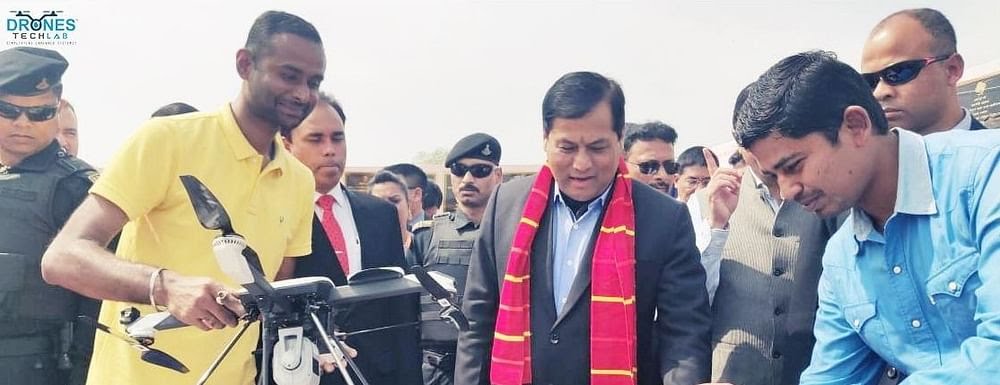Image © NASSCOM Product Conclave | Ritesh Kanu |eastmojo
SOURCE EastMojo For many years, India has been struggling with environmental issues like cyclones and floods, relying mostly on crude technologies. The absence of sufficient aerial surveillance technologies to give the nation an edge compounded the problem. The crude methods proved to be time-consuming, labour-intensive, and could not gain unlimited access to all necessary areas.

For instance, the traditional methods of mapping the Majuli Island followed by the Brahmaputra Board, under the
Ministry of Jal Shakti, were restricted to the banks. They could only get the contour data of the terrain, and plan the approach to their river revetment activity. They could mainly identify which area needed a new installation of river revetment, or a repair of the previously-installed one. However, things are changing now and for the better.
With the birth of aerial startups like Drone Tech, collating heavy data for environmental mediation and defence no longer has to be as risky or time-consuming as it used to be.
Guwahati-based Drones Tech Lab, incubated by IIM Calcutta and recognised by Assam Start-Up, is a startup that provides customised geospatial solutions through unmanned systems with accuracy, speed, innovation, and a robust service ethic. They are a solution provider in surveillance, leveraging unmanned systems that include hardware, software, and data analysis systems.
Now that we know what they do and who they are, we must also recognise how they came to be and why this innovative startup is breaking barriers in India. For instance, the company has been at the forefront, technologically and creatively, in promoting disaster management caused by Cyclone Amphan by offering drone technology to aid frontline workers. As one of its founders, Ritesh Kanu says, “With Amphan leaving thousands homeless in suburbans, we were offering our drone technology for aiding disaster management efforts put in by frontline workers.”
This mandate is being pursued vigorously as they now cater to both the private and public sectors. However, when they started in 2014, the industry was generally unpopular and underutilised in the country. They figured they should ride on the waves of global technology growth and be among the first few to blaze the trail in India.
As Kanu says, the idea for the company came about after his bank exam and when an old school friend, Biswajit Dey – armed with a degree in Aeronautics – was recuperating from an injury. “He was recuperating from an injury caused during training in Indian Army Officer’s Training Academy, Chennai. He had thought about starting a venture in drone technology which he had fallen in love with while attending one of the college symposiums.”
Kanu and Dey soon realised that unmanned aerial technology had untapped potentials which could be infused into the Indian society at an affordable rate. The need was present, the market is huge, and there was no reason not to do it.
“Dey and I felt drones and the unmanned aerial technology have huge potentials that can be implemented in various scenarios to reduce cost, save time, as well as undertake the tasks that at times prove to be fatal to humans,” Ritesh explains.
A year after the sudden realisation, they encountered the engineering manager of Skipper Limited, Guwahati, and he also became a member of the team. Debajit Deka was a welcomed addition to the team because the duo knew that they needed someone with excellent operational skills. As Kanu says, it was an easy union. “We on-boarded him as one the co-founding members, and thereon it has been a thirteen-member team working from offices at Guwahati, IIM Calcutta, and Kashmir.
And so, on an auspicious day 2014 – at a time when drones and UAVs (unmanned aerial vehicle) were not particularly popular – they went ahead with zeal and determination to carve a niche for themselves. They have, over the years, grown and expanded in size and scope.

Solving a problem
In the aerial surveillance industry, Drone Tech Lab is a solution designer and systems integrator. They were initially focused on the defence industry and building micro surveillance solutions for them. However, with the increase in demand for drones and related services, they expanded their facilities. Their aerial solution tech is equipped with oblique, thermal, and multi-spectral payloads to penetrate otherwise inaccessible places with ease and almost unbeatable speed.
“We design solutions by identifying and integrating the best-in-class hardware, software, and data analysis systems with annual maintenance contracts and services as per specific customer requirements,” Kanu notes. The advantages of aerial tech solutions include reducing human risks, real-time tracking, speed of information, accessibility to remote regions, and higher data density collation.

While the industry seems to have taken a great shape in the last few years, there are challenges that even thoroughbreds like Drone Tech Lab have to deal. One way or another, they have found a way to resolve them. Over the years, they have been notable for being instrumental in two of the main challenges in the area. First, Majuli has the issue of incessant flooding, which not only leads to loss of lives and properties but also erodes a significant part of the island. Secondly, the Kolkata Municipal faces dengue challenges every year, which results in loss of lives as well.


